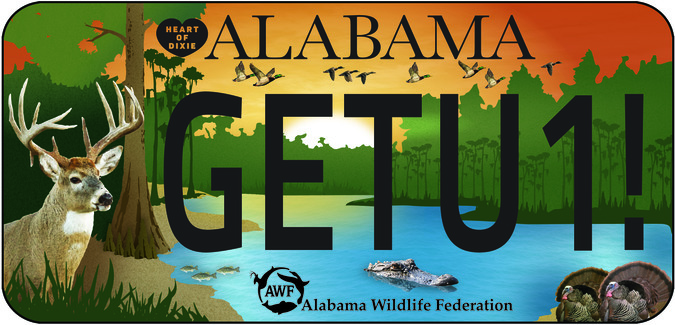Below are maintenance tips and resources that you and your outdoor classroom planning committee can use to help sustain your outdoor learning stations and your outdoor classroom from year to year. Click on the ORANGE LINKS below:
Weekly Checklist | Learning Station Adoption & Maintenance Binders
Summer Checklist | Maintenance Simplification Tips | Gardening Tips
How to Reduce Vandalism | Work Day Tips
Weekly Maintenance Checklist Tips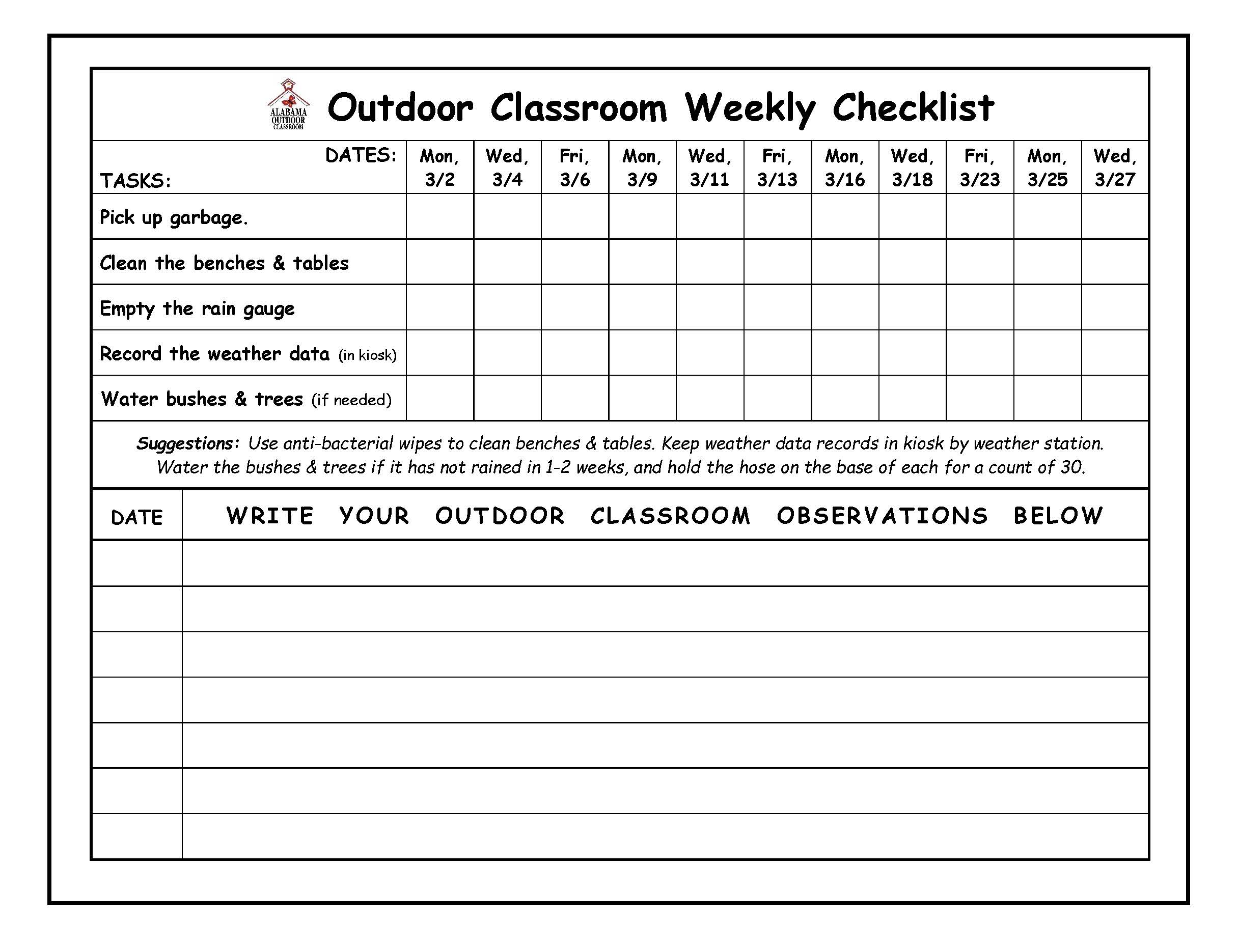
Tip #1: Create a list of tasks that you need done multiple times per week such as picking up garbage, emptying the rain gauge, and recording the weather data. Example Weekly OC Maintenance Checklist: (Word Doc | PDF)
Tip #2: Ask students from your Outdoor Classroom/Wildlife/Gardening Club or another student club to assist with the Weekly Maintenance Checklist each week. Allow the students to rotate who is in charge of the checklist each week or each month.
Tip #3: Create a schedule so that the students check the outdoor classroom at least three times per week.
Learning Station Adoption Program
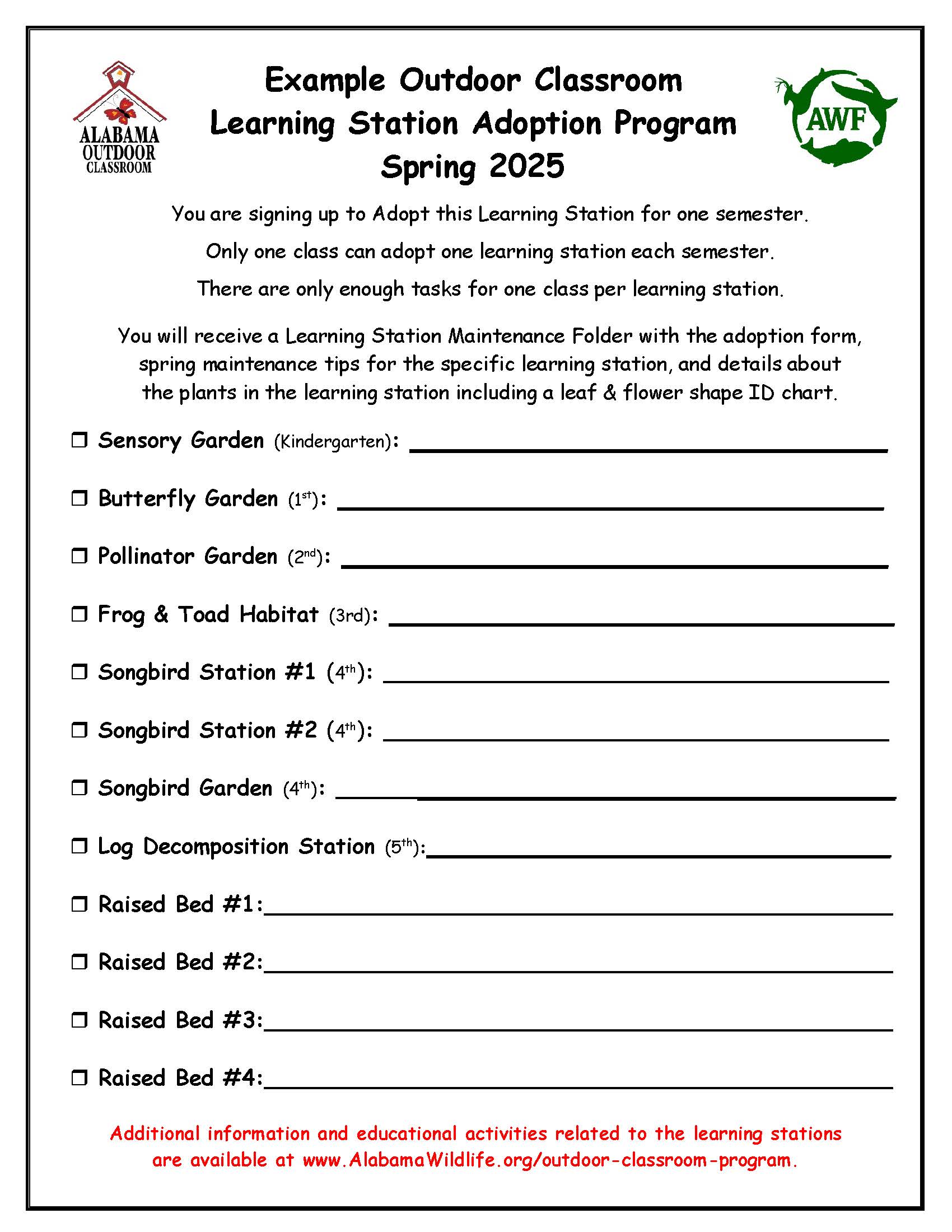
Step 1: Create a list of learning stations that you would like to have teachers and their classes adopt for one semester. Example Learning Station Adoption Sign Up Sheet: (Word Doc | PDF)
Step 2: Pass around the Sign-up Sheet at the faculty meeting in August so that teachers can adopt a learning station for the fall semester.
- One class should adopt one learning station for one semester.
- There are only enough tasks for one class per learning station.
- One semester allows the class to feel ownership before allowing another class to adopt it the following semester.
- For classes that want to adopt a raised bed garden to grow veggies or other annuals, share our Fall Veggie Gardening suggestions and our list of example Themed Gardens.
- For elementary schools, teachers from specific grade levels should adopt specific learning stations so they can use the learning station in conjunction with the Outdoor Classroom Field Investigation Activities (see list below) to help teach the Dept of Education's science standards for the grade they teach.
| Learning Station | Grade Level | OC Field Investigation Activities | OC Field Investigation Activities |
| Sensory Garden | Kindergarten | Living or Nonliving? | Basic Needs of Living Things |
| Butterfly Garden | 1st Grade | Animal Features & Adaptations | Comparing Adults to Offspring Activity |
| Pollinator Garden | 2nd Grade | How Pollinators Pollinate Activity | Critter Characteristics & Habitats |
| Frog & Toad Habitat | 3rd Grade | Comparing Life Cycles | Wildlife Habitat Checklist Activity |
| Songbird Habitat | 4th Grade | Parts of a Plant | Birds and Their Adaptations Activity |
| Log Decomposition | 5th Grade | Find a Food Chain Activity | Create a Food Web |
Step 4: Ask the classes to return their maintenance binders to the Outdoor Classroom Planning Committee at the end of the semester, so the Maintenance Binders can be redistributed to the teachers who adopt the learning stations the following semester.
Step 5: Scan all of the Observation Forms (Word Doc | PDF) for all of the learning stations, and then upload them to your OC Records Hub found at the bottom of your school's Outdoor Classroom Webpage (use our Alabama OC Schools Map to get to your school's webpage).
Repeat Steps 1-5 for the spring semester
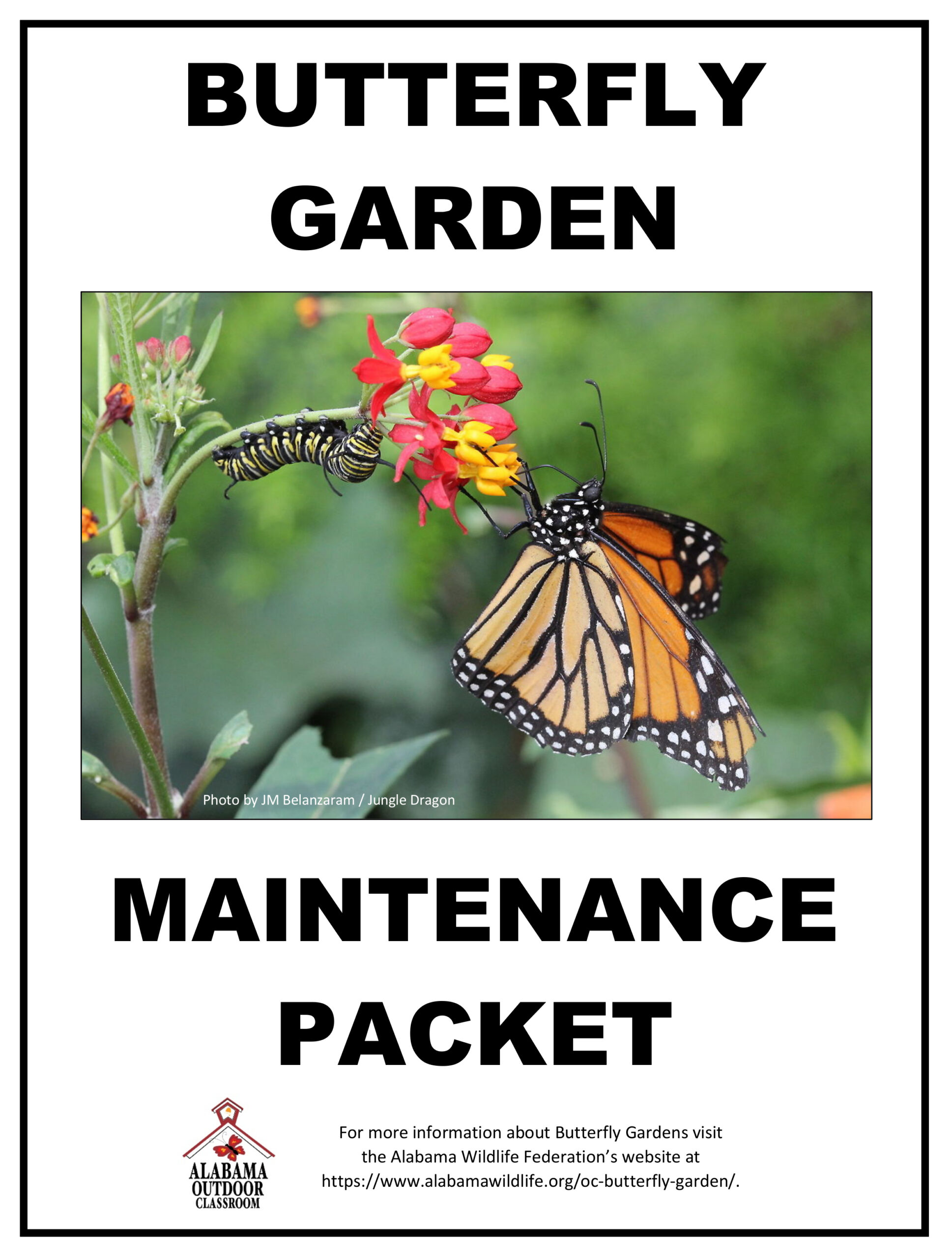 Each Learning Station Maintenance Binder should include the following:
Each Learning Station Maintenance Binder should include the following:
- Observations Form (Word Doc | PDF) for Current Semester
- Plant ID Map (Word Doc | PDF)
- Quick Fact Sheets for the Plant Species in the Learning Station or Garden
- Leaf Characteristics and Flower Shape Charts
- Fall Maintenance Tips for the Learning Station (Available below)
- Spring Maintenance Tips for the Learning Station (Available below)
- Blank Observations Form(s) (Word Doc | PDF) for Future Adoptions
- Past Observations Forms for your Records
- Relevant Publication and Other Resources
| Learning Station | Fall Maintenance Tips | Spring Maintenance Tips |
| Butterfly Garden | Word | PDF | Word | PDF |
| Frog & Toad Habitat | Word | PDF | Word | PDF |
| Pollinator Garden | Word | PDF | Word | PDF |
| Sensory Garden | Word | PDF | Word | PDF |
| Songbird Habitat | Word | PDF | Word | PDF |
| Box Turtle Habitat | Word | PDF | Word | PDF |
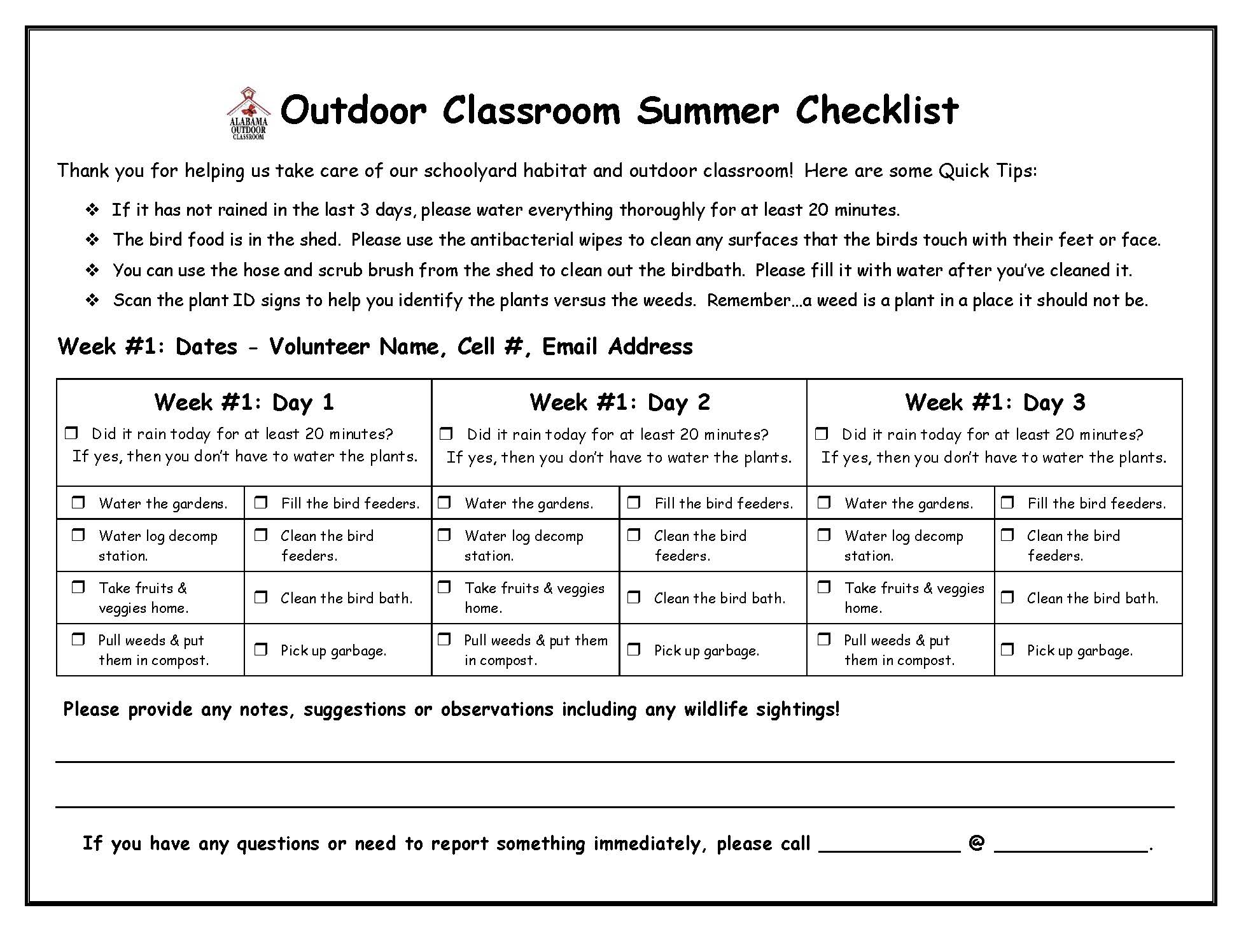
Tip #1: Create a checklist of weekly tasks that need to be taken care of throughout the summer. Example Summer OC Maintenance Checklist: (Word Doc | PDF)
Tip #2: Recruit students and their parents, student clubs, year-round school staff, community volunteers, or fellow teachers to sign-up for one week to assist with summer tasks.
Simple Tip #1: Organize your garden into learning stations, each with a specific purpose. Read more about our core learning stations and other learning stations HERE.
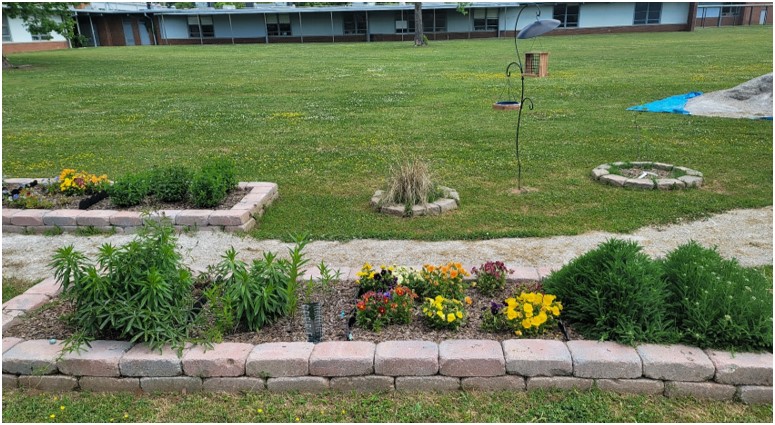
Simple Tip #2: Use low/no maintenance materials. Instead of using lumber for your raised beds, use retaining wall blocks (organize them as detailed HERE). Instead of using lumber for your Educational Signage and Plant ID Signs, use metal or heavy duty plastic materials. If you have lumber components in your outdoor classroom, consider switching to these more sustainable materials ASAP.
Simple Tip #3: Use native plant species and plant in small groups. Reduce the number of species in your garden so that there is only one species per every 3' of planting space. See our Planting Layout Charts for details.
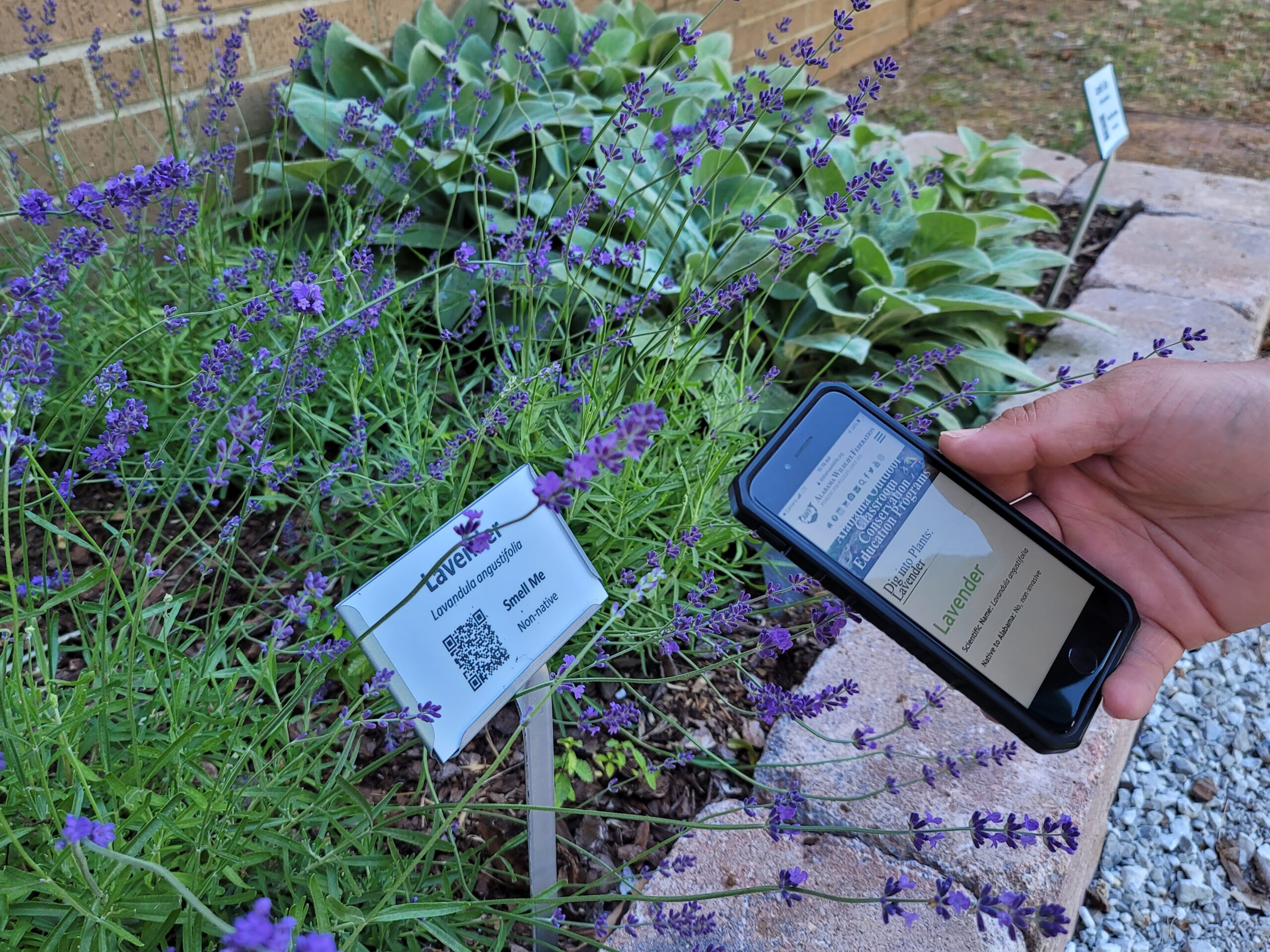
Simple Tip #4: Add a Plant ID Sign to each species' section that is linked to a Dig Into Plants webpage that explains how to care for that specific plant, including how much to water it and when to prune it.
Simple Tip #5: Limit time spent watering. Using native species will naturally require less water. Planting in fall instead of spring will allow them time to get their roots established before summer heat. Install a drip irrigation system that you can set on a timer to automatically water the plants throughout your outdoor classroom each morning.
- ACES's Gardening Calendar to create a calendar for activities such as soil testing, planting, pruning, fertilizing, and mulching for your shrubs, annuals and perennials, fruit and nut trees, and bulbs, roots, and tubers.
- ACES's Basics of Fall Vegetable Gardening to plant, grow and harvest fall and winter vegetables with your students.
Gardening Tip #3: Download the "Tips to Control Aphids on Milkweed" to learn how to control these common pests.
Learn how to Reduce Vandalism (even when it's unintentional vandalism) in your outdoor classroom.
Use our checklists and forms to hold an Outdoor Classroom Work Day to tidy up your OC, update signage, move plants around, trim bushes, pull weeds, and tend to any other annual maintenance tasks.

